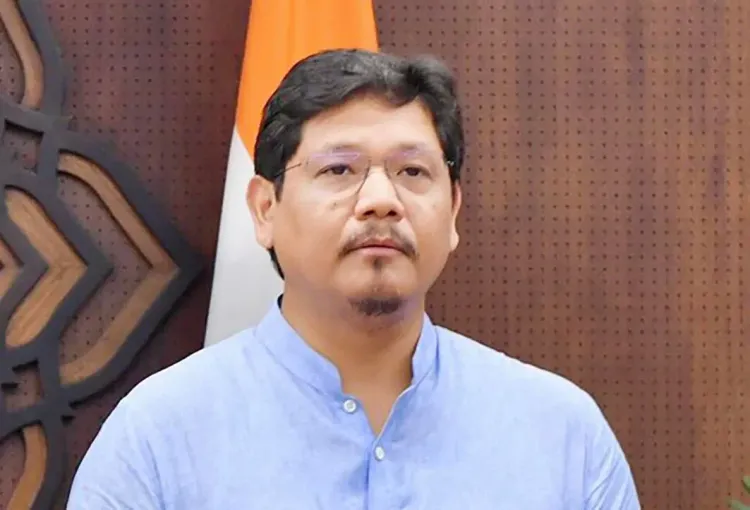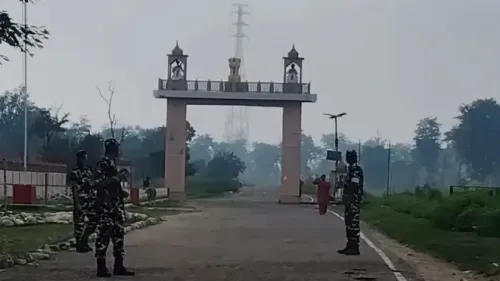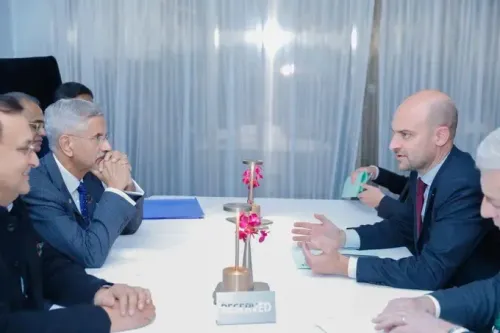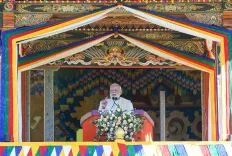Did PM Modi Acknowledge Meghalaya's GI-tagged Eri Silk ‘Ryndia’?

Synopsis
Key Takeaways
- Ryndia is a GI-tagged Eri silk representing Meghalaya’s cultural heritage.
- It is handwoven by women in Ri Bhoi district, showcasing their craftsmanship.
- The silk is ethically produced, harvested without harming silkworms.
- Sustainability and social responsibility are crucial in promoting products like Ryndia.
- Efforts are needed to support local artisans against competition from cheaper textiles.
Shillong, June 25 (NationPress) The Chief Minister of Meghalaya, Conrad K Sangma, expressed his heartfelt appreciation to Prime Minister Narendra Modi for acknowledging ‘Ryndia’ – the state’s GI-tagged Eri silk, meticulously handwoven by the talented women artisans of Ri Bhoi district.
In a post on X, Sangma conveyed, “I am thankful to the Hon’ble Prime Minister, Shri @narendramodi ji for recognizing Ryndia - Meghalaya’s GI-tagged Eri silk, crafted by the skilled women weavers of Ri-Bhoi District. Special thanks to designer KINIHO for beautifully reinterpreting our heritage.”
Sangma also shared a letter he received from Prime Minister Narendra Modi, who expressed gratitude for the piece of ‘Ryndia Silk’ presented to him, which symbolizes Meghalaya’s rich cultural heritage and pride.
“Your kind gesture is truly appreciated,” wrote the PM.
In his letter, Modi noted that there is a growing global demand for products that are not only environmentally friendly but also ethically produced, highlighting a broader commitment to sustainability and social responsibility. In this context, ‘Ryndia Silk’ emerges as a standout product.
PM Modi underscored that granting the GI Tag to this silk is a significant step that reinforces our commitment to promoting such products on an international scale.
“Whenever I visit Meghalaya, I am always overwhelmed by the warmth of its people, the stunning natural scenery, and the vast potential of its vibrant youth. Together, we will continue to serve the people of this state and ensure that Meghalaya plays a pivotal role in the journey towards a Viksit Bharat,” he concluded.
In Meghalaya, Eri silk—known locally as Ryndia—is more than mere fabric; it represents a time-honored tradition upheld by tribal women.
Harvested from the Samia Cynthia Ricini silkworm, which nourishes itself on castor leaves (Rynda), this "peace silk" is collected without harming the larvae, earning its ethical acclaim.
Ri-Bhoi district is the heart of this craft, where women cultivate silkworms, spin yarn, and weave using traditional tools like the Takli, passing their skills down through generations.
Unlike regular silk, Eri’s wool-like texture and durability make it a treasured heirloom. Its production is fully led by women, with natural dyes derived from turmeric, onion skins, and native plants like Sohkhu providing vibrant colors.
This eco-conscious method, unique to Ri-Bhoi, avoids synthetic chemicals, thus preserving both heritage and the environment. While Eri silk embodies Meghalaya’s cultural identity, weavers face challenges from cheaper textiles.
Initiatives aimed at promoting this sustainable fabric could protect livelihoods and ensure that this ancient craft persists for future generations.








